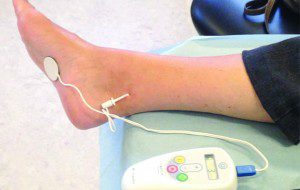By Joseph Gauta, MD, FACOG –
 Many people suffer from an Overactive Bladder (OAB) and are desperate to find a solution. No one should have to experience the annoying and embarrassing problem of a constant need to use the toilet. While an Overactive Bladder can occur in both men and women, it generally affects women more often. The symptoms include urinary urgency, frequency, and even incontinence.
Many people suffer from an Overactive Bladder (OAB) and are desperate to find a solution. No one should have to experience the annoying and embarrassing problem of a constant need to use the toilet. While an Overactive Bladder can occur in both men and women, it generally affects women more often. The symptoms include urinary urgency, frequency, and even incontinence.
While all of the causes are not known, we do know that certain activities can make the situation worse. For example, drinking excessive amounts of caffeine, soft drinks, and alcohol can have an unwanted diuretic effect. Sometimes, simple lifestyle changes may help alleviate symptoms. Also, physical regimens such as bladder training and pelvic exercises may be beneficial.
The use of medications has been proven to be effective, as well. Other options may include surgical procedures that include Augmentation Cystoplasty, Urinary Diversion, or a Urethral Sling. While these have been shown to work in some case, they are still surgical procedures that carry their own risk. A new and very promising form of treatment is called Percutaneous Tibial Nerve Stimulation (PTNS). This involves the insertion of neurostimulator electrodes into the lower leg. The goal is to send stimulation through the tibial nerve. A surface pad is placed on the outside of the leg and an external pulse generator then delivers a mild electrical signal that travels to the sacral nerve plexus. The sacral nerve plexus, among other functions, regulates bladder and pelvic floor function.
PTNS is a low-risk procedure and no major safety concerns have surfaced. This makes it a viable alternative for many who suffer with OAB. In separate studies, the success rate has been shown to be over 75%. Locally, Joseph Gauta MD, a renowned Urogynecologist has seen success with this procedure first hand. With PTNS, there is great news for anyone suffering from an overactive bladder.
While this option may not be for everyone, its very promising to those who suffer from OAB. If you have any questions regarding Overactive Bladder (OAB), please contact the Florida Bladder Institute at (239) 449-7979. It is one of the leading women’s surgical facilities in Southwest Florida. They specialize in both Gynecology and Urogynecology. The Florida Bladder Institute is located at 1890 SW Health Parkway – Suite 205, Naples, Florida 34109. You can also visit their website at: www.floridabladderinstitute.com.
Dr. Gauta, board certified in Female Pelvic Medicine and Reconstructive Surgery as well as OB/Gyn was asked for his opinion on which female permanent birth control method he recommends. “There is no perfect method and the risks and benefits should be carefully discussed with each patient. A thorough evaluation needs to be done of each patient to help them decide which method of permanent birth control is best for them. The opportunity for women to have an office procedure with minimal anesthesia and recovery time motivates most patients to elect Essure over the traditional tubal ligation done under general anesthesia. The Essure procedure has been performed on over 500,000 women worldwide since 2002 with minimal adverse effects.”
Dr. Gauta, how much does Essure cost?
“Essure when done in the physician’s office is less expensive than the traditional laparoscopic approach done under general anesthesia. Essure is covered by most insurance carriers and often just costs the patient an office co-payment.”
Dr. Gauta, on the internet there are some negative comments regarding the Essure procedure. Can you please comment on those?
“With any procedure there are risks. No one can educate a patient on their potential for adverse effects better than an experienced physician. Thanks to the internet patients are very well educated and have many good questions when they come to see me. Patient’s should be cautious about what they read on the internet though. There may be one very vocal patient that had an adverse reaction for every 1,000 that are living very happily. Make sure you do your homework on the procedure, and make sure your physician is experienced with the procedure and how to handle any complications. Don’t be afraid to ask a physician about their training, experience and outcomes. You should always be well educated and confident in your decision before you have any procedure done.”









